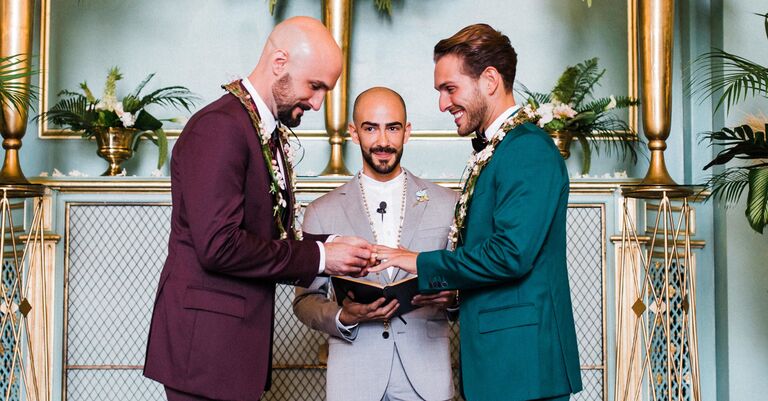How to Get Ordained and Officiate a Friend's Wedding

They asked and you agreed, but the next step is answering the question: How exactly do I officiate a wedding, and how do I get ordained? Most wedding officiants are self-taught after getting ordained online or going through the official process at the local county clerk's office. But, if you're here, it's because you likely want to take that extra step of precaution and preparation, which will result in you confidently bringing the lucky couple together in legal marriage. (This piece, by the way, isn't only for to-be-officiants. If you're getting married and still need to track down someone to preside over your wedding ceremony, read our officiant directory to find one in your area.)
We love the idea of having a friend officiate your wedding--it's both budget friendly and personal. It's important to know that rules vary from state-to-state, so check if an online ordination is considered a legal way to become a minister. If so, your friend will want to get ordained online or at the local county clerk's office, which is often a quick and simple process. Check with the local office for details on specific requirements, such as filing the marriage license, the ages of consent and if they need to take a blood test. Also, some states require the wedding officiant to file additional paperwork before the county clerk will allow them to apply for a marriage license. Finally, on the wedding day, the officiant's time to shine will be when he conducts the ceremony (according to the couple's wishes), signs the marriage license and returns it to the office of issuance.
1. Know Local Laws
Law vary by state, so it's important that you study up on local officiating rules to legally ensure that the wedding will happen. You will need to focus on the state where the wedding is taking place (not where you're from or the state that the couple calls home).
Along with presiding over the ceremony on the wedding day, legally following state laws will be one of your biggest responsibilities as an officiant. It's worth mentioning that a wedding you perform could be illegitimized, resulting in a fine if the proper laws aren't followed. No pressure, though: Wedding laws are typically straightforward and if there's still some confusion, pick up the phone and dial the local county clerk's office to help clarify any lingering issues.
2. Get Ordained (If Required)
While some states don't require officiants to be ordained ministers, others do--which is why the next step is checking if the wedding location is accompanied by this requirement. But no need to fret, you're not required to join a seminary to officiate a wedding. Here's how to get ordained online.
If you practice a certain religion and the to-be-weds agree, confirm that the state where the wedding will take place will recognize a marriage ordained by this religion. Then, search for online ordination options. If you'd rather become ordained by an non-denominational or interfaith organization, that's an option too. Some of the most commonly searched online options include American Fellowship Church, Rose Ministries, Universal Life Church and Universal Ministries.
Double check, however, that local state laws will recognize the online ministry for legitimacy purposes. Ordination may include filling out some paperwork, taking some courses, and/or paying a fee, but it's an easy process overall as long as you're thorough up front.



3. Spend Time With the Couple
You might know the couple well, especially if they've asked you to perform their marriage ceremony. But you should schedule a few meetings with the to-be-weds prior to the big day. It doesn't necessarily need to be in person (there are plenty of alternative communication options that will still do the trick).
Legally, you'll need to look over the marriage license together and ensure everyone is on the same page in order for it to be legitimized.
For the wedding ceremony itself, you'll need to learn more about the couple's wedding vision and style. Do they want the procession to be traditional and simple, or are they requesting that you craft something original and heartfelt? If it's the latter, chat with the couple's close friends and family members—collect anecdotes, quotes and insights that can help enrich your ceremony script and make it personal.
4. Plan the Ceremony
Now it's time to get writing. This role comes with several responsibilities, including setting the cadence and schedule for the ceremony, while presiding over the sequence of events. Something that officiants forget is that the role is collaborative, not only with the couple, but with those involved in the readings, any song performances, and more. If the couple has a planner or an on-site coordinator, it's also important that you map out the ceremony with these individuals.
Our best advice is to start with an overarching template and personalize it from there. Also ensure all local state laws are included in the ceremony script so that you have it covered.
5. Rehearse and Refine
In life, they say timing is everything, so make sure you're cognizant of that with your script. A pro tip is to rehearse your script aloud against a timer to ensure you're within the time frame designated by the couple or their planner.
Then, do one final dry run with a friend (bring a red pen for this session). Take care of details like finessing all pronunciation of family members' names, as well as working on the delivery--pausing for laughter and emphasizing the correct words are all key to turning your script from good to great.
And if public speaking isn't exactly your wheelhouse, beat the nerves by rehearsing with loved ones repeatedly. The rehearsal is a great time to work out any final issues if time allows. (But be mindful and ask the couple if they want to participate, or if they'd like to keep their ceremony a surprise.)
6. Track the Marriage License
It's the couple's responsibility to pick up the marriage license within a certain time frame before the wedding. Don't forget to remind them or touch base just in case. On the wedding day, either the couple or wedding party members will have this on hand.
7. Officiate the Ceremony
The day has arrived. You've prepared for this moment and the fruit of such work will finally be shared with the couple and their beloved guests. The best advice we can give? Relax and be present. Remember: It's about the couple and you're simply there to support them on their special day
8. Sign the License
After the ceremony is completed, both you and the couple will have to sign the license. Then, you will be required to return it to the local county clerk office within a set timeframe. (All of this will be explained in detail when the marriage application is completed prior to the wedding.) Follow the instructions, submit the completed license, and the couple will receive a certificate of marriage a few weeks later. Voila!




















